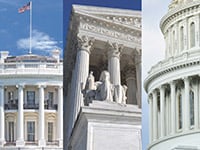|
In this issue, we anticipate the changes to DOL and the NLRB under this new administration and Congress. We also provide important updates on non-compete agreements in the workplace, and paid sick leave for federal contractors. We also provide updates on family and paid leave in New York and Maryland, and a new California Labor Code for employers in California with employees who live or work in California. |
|
| ARTICLES | |
 |
Labor and Employment under President Trump – A Still-Evolving Picture We were closely watching the confirmation hearings of Labor Secretary nominee Alexander Acosta. Acosta, Dean of the Florida International University Law School, was nominated by President Trump one day after CKE Restaurant Holdings' CEO Andrew Puzder withdrew from consideration. We will provide more analysis for employers following his anticipated confirmation. Among other topics of interest to employers is the state of the "white collar" exemptions. Speaking of Acosta, who served as a member of the NLRB in 2002-2003, we have also been watching for signs of how the NLRB will operate under the Trump administration. In a January article, we reviewed the five things every employer should know about the NLRB and our predictions of the shape of the Board to come. Follow these developments and all of our analysis of the goings-on in Washington on our Presidential and Congressional Outlook resource site. |
 |
The News in Non-Competes Although the arrival of the Trump administration moots the Obama White House's "State Call to Action on Non-Compete Agreements" addressing that administration's concerns about non-compete agreements in the workplace, the fact remains that non-competes are governed by state law, and some of the issues raised in the "State Call" will remain with us. One such issue is the enforcement of non-competes against employees who are terminated without cause. Many employers limit themselves by too narrowly defining "cause" in their agreements. This was borne out by a 2016 New York appellate decision. The court confirmed that in New York, any employer who terminates an employee without cause risks losing the ability to enforce a non-compete agreement against the employee. In addition, New York Attorney General Eric Schneiderman has promised to introduce a bill that would restrict New York employers' use of non-compete agreements for certain non-highly compensated employees. In our Trade Secrets blog, we discuss the proposed legislation. |
 |
Do You Have Employees in California? Are you an employer based outside of California with employees who live or work in California? If so, you will want to take note of a new California Labor Code provision that went into effect on January 1, 2017. Companies need to be aware that this law limits their ability to apply the substantive law of a different state to their California employees. |
 |
New York Makes Advancement in Family Leave, Maryland in Sick Leave New York's Paid Family Leave program will go into effect on January 1, 2018. Accordingly, on February 22, 2017, Governor Andrew Cuomo filed the official regulations that will implement the program. Among other items, the regulations clarify that the program will apply to all private employers, regardless of size, and employees will become eligible for paid family leave after working at least 26 consecutive weeks (or 175 days, for part-time employees). At first, employees will be entitled to 8 weeks of paid family leave, paid at the lower of 50% of the employee's average weekly wage or 50% of the state average weekly wage. The leave entitlement will then be increased annually until 2021. Turning a few hundred miles south, Maryland employers should note that paid sick leave could be mandatory for many Maryland employers by the end of this year. The Maryland General Assembly is currently considering two different paid sick leave mandates: the Maryland Healthy Working Families Act and the Commonsense Paid Leave Act. |
 |
Government Contractor Corner Last fall, the DOL published its Final Rule implementing Executive Order 13706, Establishing Paid Sick Leave for Federal Contractors. The Final Rule requires parties who enter into covered contracts with the federal government to provide covered employees with up to 7 days of paid sick leave on an annual basis. It applies to covered contracts that (1) result from solicitations issued on or after January 1, 2017; and (2) are awarded outside the solicitation process on or after January 1, 2017. The Final Rule, though, may be subject to repeal or modification, in light of the issuance of the Executive Order, Enforcing the Regulatory Reform Agenda, which calls for regulatory reform task forces to identify burdensome regulations for possible repeal, replacement, or modification. |